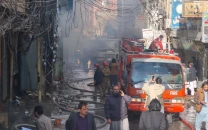I am a victim of ‘Zhagh’ and I am fighting back
Zhagh is a custom where man lays claim to marriage with woman by firing gunshots outside her door, shouting her name

No, the draconian custom did not kill me. It tried to push me into an embarrassing forced marriage. PHOTO: FILE
When a man empties the magazine of his gun in front of a woman’s house in northern Balochistan and shouts her name, her life is ruined, dreams are shattered while the family struggles to save her future on the pretext of an archaic local custom called ‘Zhagh’.
No, it does not kill her. It pushes her into an embarrassing forced marriage sometimes, while leaves her dejected most of the times.
Villager rescues women from brutal tribal custom
Per custom, Zhagh is where a man lays claim to marriage with a woman and no one else is allowed to send proposals for her. Marriage disputes can lead to tribal feuds and even armed clashes, which can then last for generations.
The draconian custom is prevalent in the northern districts of Balochistan, especially in Loralai, Zhob, Ziarat, Sherani and Killa Saifullah, where hundreds of women have forcibly been given into marriages.
Zhagh can be called a gender-based ferocity in which a man imposes his will on a woman and her entire family. This custom in Balochistan allows a man to claim a particular woman for marriage through an open declaration and that too without her or her parents’ consent.
Regardless of his age, when a man shouts a woman’s name at her doorstep, other men cannot send their marriage proposals to the woman’s family to avoid enmity. In an unacceptable manner, the woman stands engaged to the man while her family protests in vain. The woman is then left to confront difficulties her entire life.
Some of these women marry the man; others opt to remain single instead of spending the rest of their lives with a man they do not approve of. In both the cases, only the women as victims face humiliation.
“I was shocked when I heard a married man, who had children, taking my name under this brutal custom. He wanted to marry me,” recalls Mermana. She became a victim of the horrific custom seven years ago.
“How can it be a fair custom? The man who shouted my name is still scaring me and pressuring all those who are interested in sending their marriage proposals for me.”
Little space for women lawmakers in Balochistan
Years have passed. Mermana is still not ready to marry that man. Even her suitor is reluctant to withdraw from his claim. She has been demanding justice from the elders of her village, But her efforts have gone in vain.
“I will never accept a forced marriage with a man who has a daughter and a son. I want to be happily married, but definitely not after being a victim of this custom [Zhagh]. Else, I will stay single for life.”
Regrettably, Zhagh has become a social stigma in Balochistan. The custom is also considered as a violation of family honour because, in the province’s conservative society, a family feels ashamed when a man openly announces his desire to marry its woman. A victim’s family may also take revenge from the man who practiced Zhagh against them. Sometimes it changes into animosity between families.
Twenty-two-year-old Gula’s* family had refused one of her marriage proposals. The man, whose proposal was rejected, made her a target of Zhagh in 2015. Nevertheless, her family chose to retaliate for dishonouring them.
“My brothers chased the man. They assaulted him in a bid to kill him for bringing humiliation to the family member, but instead, he was injured,” says Gula. “Our family animosity started three years ago.”
Although Gula's brothers have received several death threats by the man’s family, they still demand that they hand over their sister to them.
K-P Assembly criminalises ‘Ghag’ custom
Financially unstable and socially weak victims and their families find no other option but to flee to safe places and protect their women and men. However, many end their lives after being persecuted by the stone-age social norms and attitudes.
Naqeeb Khan, the father of another Zhagh victim Shazia, says in 2012 a local imposed the custom on his daughter and insisted that only he would marry her.
“When people used to come to my house with my daughter’s marriage proposal, he [the man] pressured them to not marry Shazia. No one was willing to marry her.”
Shazia’s father approached a jirga and clerics to get the tribal court and Islamic perspectives on the issue. The jirga and the clerics, Khan says, both maintained that marriage without a woman’s consent was illegal. However, their assertions could not change Shazia’s fate.
She preferred to end her life instead of being shackled in an unwanted marriage.
It is also true that there is no legal instrument or mechanism in the country and the province to protect women and their families against the draconian custom. Cultural barriers in Balochistan also bar women from approaching the courts. They are usually left with no other option but to remain silent.
Why are female journalists still taboo in Quetta?
The Khyber-Pakhtunkhwa Assembly in 2013 passed a bill against ‘Ghag’, a similar custom with a different name in the province. However, in Balochistan, seems like it is not even on the provincial government’s agenda.
Saying protecting women is important, MPA Spozmi Achakzai of the Pakhtunkhwa Milli Awami Party says, “I will try to bring a bill in the provincial assembly against Zhagh to declare this custom illegal in Balochistan.”
“Due to illiteracy, conservative norms exist in some areas of the province treating women worse than slaves. All the unfair customs against women can be diminished by introducing new law and policies,” she stresses.
Some men in Balochistan, on the other hand, believe that this custom provides them with an option to pick the woman of their choice.
Akram, who got married through Zhagh, says the archaic local custom is “better” because it is also important to know who you are going to marry. However, being a man, he now admits that the consent of a woman is vital as that of a man’s will.
“It is our right to choose a life partner but with their consent. Zhagh does not allow locals to select women with their consent for marriages and hence, destroy the couple’s life.”
The horrific tales of Zhagh does not end here. Several untold stories of its victims haunt the locals in Balochistan. Their opinions were never asked, nor do they matter to the men.
*Names have been changed to conceal identity.
Hizbullah Khan is a freelance investigative journalist.


















COMMENTS
Comments are moderated and generally will be posted if they are on-topic and not abusive.
For more information, please see our Comments FAQ